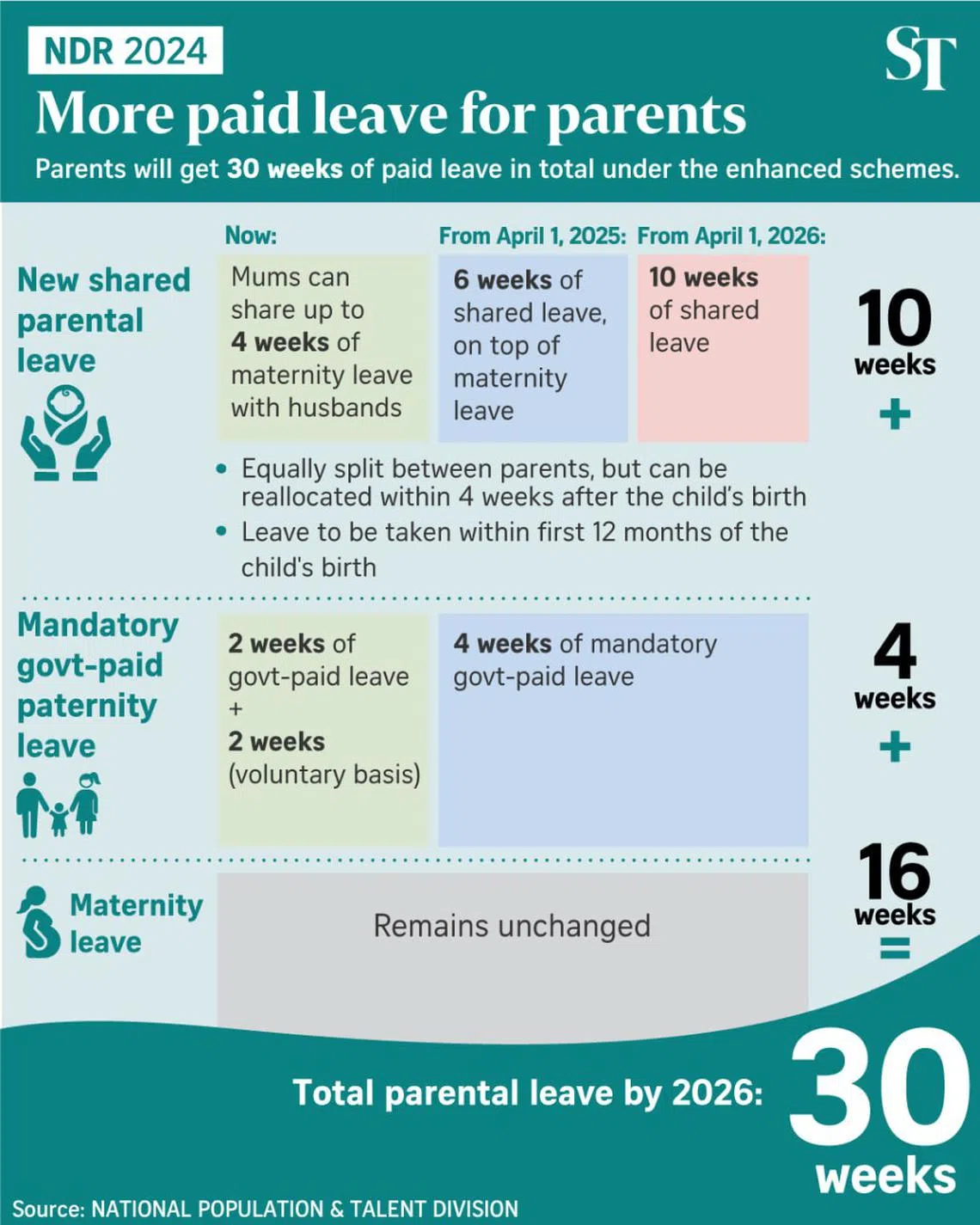SMEs hope for more support with added parental leave; large firms confident of coping
Sign up now: Get ST's newsletters delivered to your inbox

While smaller enterprises projected an air of nervousness, large organisations that ST spoke to said they were confident they can sustain a revolving door of talent.
ST PHOTO: LIM YAOHUI
SINGAPORE – As a father of two young children, with a third due in November, Mr Lee Kang Hui followed with interest Prime Minister Lawrence Wong’s announcement of new parenthood policies in his first National Day Rally speech on Aug 18.
He had anticipated that the two weeks of voluntary paternity leave announced in 2023 would become mandatory for employers, but was taken by surprise that parents will get an extra 10 weeks of government-paid leave from April 2026.
Though supportive of the news as a dad, he instantly snapped into work mode, thinking about how this would impact his company.
Mr Lee, 35, is the head of finance and people at Providend, a home-grown wealth advisory firm with about 25 employees who mostly perform specialised roles. In such a small firm, every employee’s absence is keenly felt, he said.
PM Wong’s announcement means a new mother could go away for more than six months, instead of the current four, while a new father could be on leave for over three months, instead of a month. Either scenario is possible if one spouse takes most of the shared 10 weeks.
While smaller enterprises projected an air of nervousness, large organisations that The Straits Times spoke to said they are confident they can sustain a revolving door of talent, or redeploy resources to cope with the prospect of new fathers or mothers going away on longer parental leave.
The public service, which is Singapore’s largest employer with some 153,000 officers, said it would establish internal covering arrangements, with work redeployed and reallocated to ensure operations stay uninterrupted.
This is in line with how the public service has accommodated maternity and paternity leave arrangements in the past, said a Public Service Division spokeswoman. It will also continue to explore ways to optimise existing processes.
Providend’s Mr Lee said his firm will have to rethink its organisational structure, and look at how to upskill or cross-skill its people to cover their colleagues.
The challenge is that not all roles can be outsourced. For instance, Providend handles sensitive personal data that cannot risk being leaked to outsiders.
Even if there are non-core and non-critical functions that can be filled by temporary or part-time staff, Mr Lee said, small- and mid-sized enterprises (SMEs) like his usually struggle to find suitable applicants, as candidates with the right qualifications tend to line up more readily outside the doors of larger multinational companies.
Ms Abigail Yu, director of corporate service provider 3E Accounting, said SMEs are generally more susceptible to such policy changes due to their smaller headcount.
“Especially if such absences are prolonged, it can be difficult practically to adjust and reshuffle the work around, when there is limited manpower within the company,” she said.
Ms Yu said her firm, with 80 employees, has extra capacity on standby and keeps workloads reasonable in order to adapt quickly for such scenarios.
But these may not be enough when the new policies are in place – 3E intends to hire more part-timers or consider outsourced options to cover the work of employees on parental leave.
Part of the consideration is sustainability in the longer term. “SMEs have to think of ways to redistribute the work around but not increase the workload of existing employees drastically,” Ms Yu said.
Some kinds of work at 3E are difficult for part-timers to step in and cover, in which case full-time staff who take on an increased workload due to their colleagues’ absence are rewarded with bigger bonuses. But Ms Yu recognised that this is effective only up to a point.
Mr Lee Tuck Wai, chief executive of consultancy firm Upconverge, agreed with her, noting that redistributing work to other staff would mean greater risk of employee burnout, which could in turn impact team dynamics and drive up the rate of staff attrition.
But other solutions come with the added costs of recruitment, training, onboarding and offboarding, said Mr Lee, who also chairs the Association of Small and Medium Enterprises’ human capital action group.
He called for attention to be paid to smaller firms to implement the new mandatory parental leave, as their staff strength is typically “as lean as they can manage”.
This was a point also made by Mr Ian Lee, who is president of geographic regions for workforce solutions company The Adecco Group.
Special attention should be paid to SMEs to ensure that the policy does not present insurmountable operational challenges that hurt their business viability, he said.
If companies’ difficulties are left to fester, SME bosses could end up outwardly implementing the parental leave policy, but stage a “silent strike” by steering away from hiring people of a certain childbearing age. Covert workplace discrimination would be the worst possible outcome, Mr Ian Lee warned.
Companies might also incur additional costs in the overlapping periods where both the returning employees and temporary staff are needed.
In such cases, Nominated Member of Parliament Mark Lee said, the Government can consider paying the salary of workers returning to the office after parental leave for an extra one to two months. This will go a long way towards mitigating the operational impact, he said.
Mr Mark Lee, the chief executive of Sing Lun Group, said that some smaller outfits do, in fact, go the extra mile to implement flexible work arrangements for parents. But workers must also build trust with their employers, he added.
This includes providing ample notice so bosses and colleagues have time to react and make workload adjustments, and being flexible and available in emergencies, even while on leave.
This can go a long way towards fostering teamwork and mutual respect, said Mr Mark Lee, who is also vice-chairman of the Singapore Business Federation.

Inconveniences and challenges notwithstanding, employers and employees should recognise that they are solving a happy problem when an employee becomes a parent, he added.
Mr Ian Lee concurred, noting that Singapore is at a point of “very, very low” total fertility rate, which was 0.97 in 2023.
Without enough younger people to refresh the workforce, the country will have to rely on foreigners to make up the numbers, he said.


